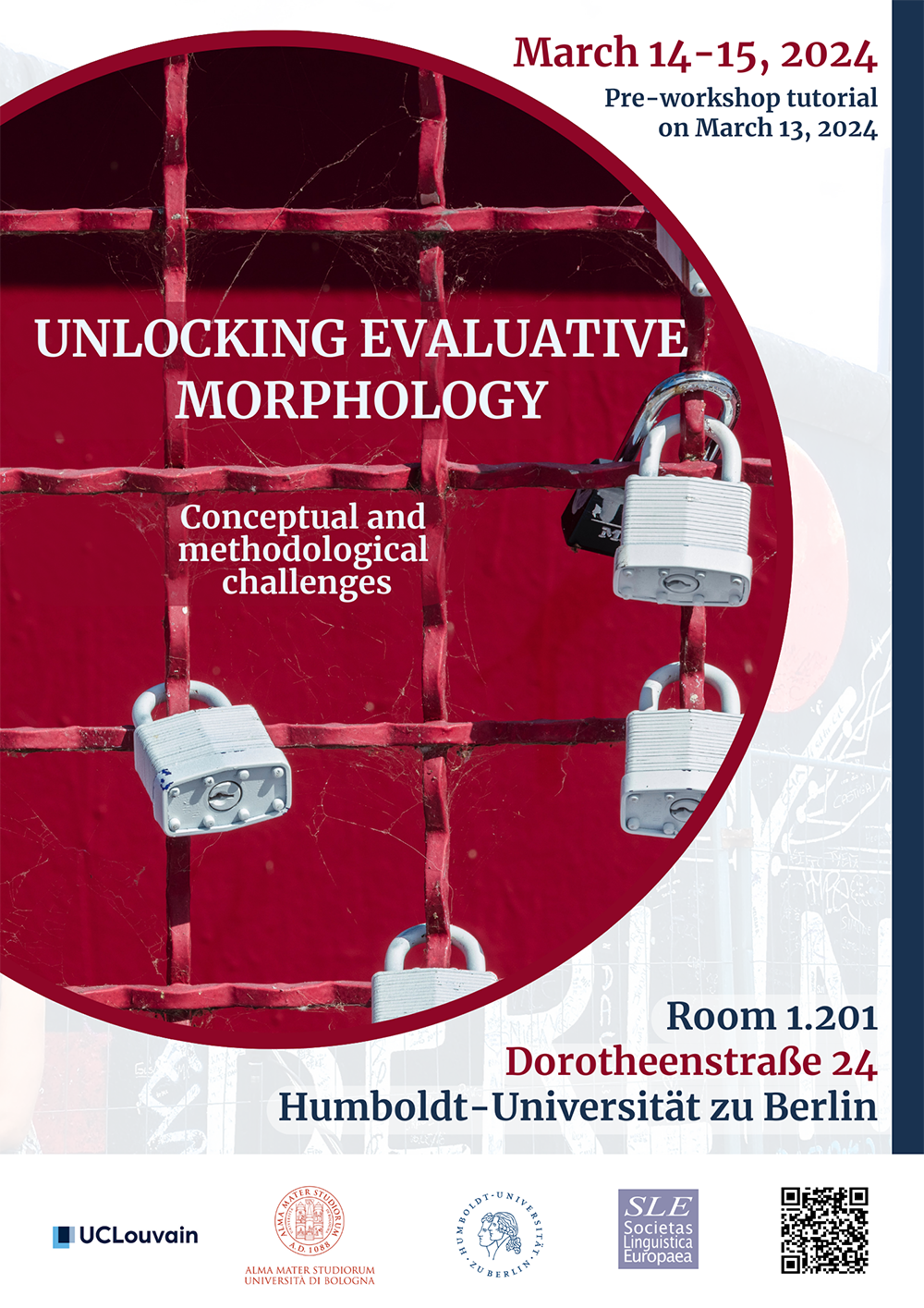Unlocking evaluative morphology: Conceptual and methodological challenges
Hybrid workshop at the Humboldt-Universität zu Berlin, March 14-15,2024, with a pre-workshop tutorial on March 13
- https://www.ni.hu-berlin.de/de/termine-ordner/ws-23-24/2024-03-13-unlocking-evaluative-morphology
- Unlocking evaluative morphology: Conceptual and methodological challenges
- 2024-03-13T00:00:00+01:00
- 2024-03-15T23:59:59+01:00
- Hybrid workshop at the Humboldt-Universität zu Berlin, March 14-15,2024, with a pre-workshop tutorial on March 13
- Was Workshop
- Wann 13.03.2024 bis 15.03.2024
- Wo DOR24, Raum 1.201
- Name des Kontakts Muriel Norde (HU), Francesca Masini (Alma Mater Studiorum – Università di Bologna), Kristel Van Goethem (F.R.S.-FNRS & Université catholique de Louvain), Daniel Ebner (HU), Beatrice Bernasconi (Roma Tre University & University of Rome “La Sapienza”), Flavio Pisciotta (University of Salerno)
- Web Externe Webseite besuchen
-
iCal
Unlocking evaluative morphology: Conceptual and methodological challenges
Location
Directions to the venue: The nearest station is Bahnhof Friedrichstraße, which is serviced by the Tube (U-Bahn), Urban train (S-Bahn) as well as local trains. Information on public transport in Berlin can be found here: Berliner Verkehrsbetriebe: BVG. The main entrance to the building Dorotheenstraße 24 (10117 Berlin) is through Hegelplatz square (cf. the map attached, 498 KB).

This workshop – funded by the SLE Research Grant – Joint Initiative scheme – is concerned with morphological expression of evaluative semantics (Grandi & Körtvélessy 2015), such as diminution (Dressler & Barbaresi 1994), intensification (Rainer 2015) or approximation (Masini, Norde & Van Goethem 2023). Evaluation is a broad concept, covering a wide array of values that are not always easy to distinguish from each other. Within approximation, for instance, we may identify privativity (Cappelle, Daugs & Hartmann 2023), similarity (Masini & Micheli 2020), depreciation (Amiot & Stosic 2022), fakeness (Van Goethem & Norde 2020) and a great many others. On the formal side, evaluation can be expressed by prefixes such as pseudo- (Vassiliadou et al. 2023), suffixes such as -ish (Eitelmann, Haugland & Haumann 2020), prefixoids such as German Hammer- ‘fantastic; very’ (Norde & Van Goethem 2018), or reduplication such as Mädchen-Mädchen ‘girly girl’ (Frankowsky 2022). On all levels, moreover, we find overlap and competition – similar values can be expressed by different bound morphemes and vice versa, often within one and the same language.
The purpose of this workshop is to gain a better understanding of the sources, formal expressions and values of evaluative morphology cross-linguistically, addressing the following Research Questions:
- Which evaluative values can be expressed morphologically and how are they related to each other?
- How do morphological expressions of evaluation compete? Can they reinforce one another?
- What is the relationship between evaluative morphology and evaluation on other levels (e.g. free adverbials)? Again, is there competition and / or reinforcement across linguistic levels?

